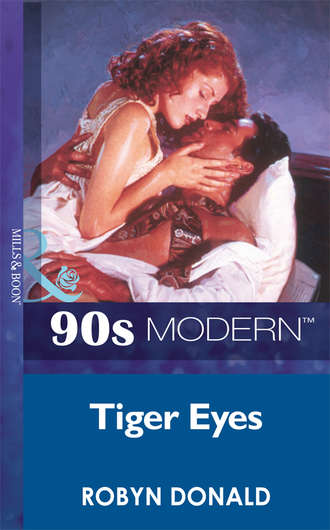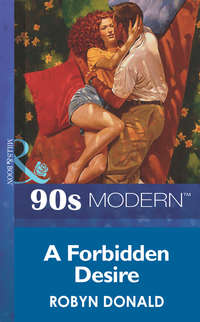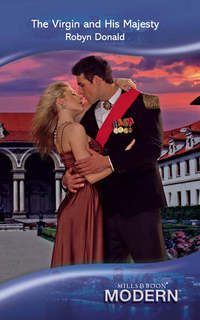
Полная версия
Tiger Eyes

Tiger Eyes
Robyn Donald

www.millsandboon.co.uk
CONTENTS
CHAPTER ONE
CHAPTER TWO
CHAPTER THREE
CHAPTER FOUR
CHAPTER FIVE
CHAPTER SIX
CHAPTER SEVEN
CHAPTER EIGHT
CHAPTER ONE
TANSY ORMEROD shivered in the frigid air blasting straight up from the South Pole. Although she’d had four years to get accustomed to the winds that buffeted Wellington she still found them hard to bear. And three weeks before Christmas it should be summer, warm and languorous, calling people to the beaches and the mountains.
Except that in New Zealand’s capital nothing to do with the weather was ever so easy. The city’s position on the southern coast of the North Island, open to the funnel of Cook Strait and the wild southern gales, meant that its reputation as Windy Wellington was well-earned.
‘You’re too thin. And born and bred in Auckland—that makes you a total wimp,’ Rick used to tease.
‘So were you.’
‘Yes, but I spent my first five years in Christchurch. Now that’s a climate you can get your teeth into!’
A reminiscent smile curved Tansy’s controlled mouth. She hadn’t expected to miss Rick. He’d been good company and she’d grown fond of him, although he’d only stayed a couple of months. Four months ago he’d gone to find his own destiny, leaving her surprised at the gap in her life.
That secretive little smile widening, she invited the passers-by to enjoy the mock-tragic ballad she was soulfully singing. Several coins landed in the guitar case at her feet, but not enough. Her gaze roamed further, beyond the lines of cars inching their way forwards.
He was back.
Few passers-by noticed the falter in her poignant small voice; the momentary lapse in concentration wasn’t obvious except to her. That same large, discreetly opulent car, with the same man driving it, had sat opposite her for almost an hour on each of the last three days.
Of course, it meant nothing. Danger here came from people as poor as she, people who preyed on the buskers, not dark men with hard-edged, haughty profiles who could afford cars like that. It was just a coincidence. Perhaps he thought she was haunting him!
The last chords on her battered guitar summoned a smattering of applause, augmented by the cheerful clunk of coins landing in the case.
‘That was a pretty tune. What’s it called?’ a middle-aged woman asked encouragingly.
Tansy’s expression relaxed, although she kept a close watch on the money. Years spent earning her living as a busker meant she trusted very few, and certainly no one on the street. Yesterday her whole day’s takings had been stolen when she went to the aid of an old man who’d had some sort of seizure close by. She’d only been gone five minutes, giving him first aid until others took over, but the money had disappeared when she got back.
She should, she supposed with a flash of acid humour, be grateful they’d left the guitar case behind!
‘”Lament for a Lover”,’ she said, smiling.
The woman nodded and moved on. The person who took her place was big enough to block the keen force of the wind. Tansy looked up, one hand pushing back a straggle of carroty hair that refused to stay confined beneath her black beret. Her carefully impersonal smile froze into a travesty.
It was the man from the car.
That first shocked glance told her his presence wasn’t one of the meaningless coincidences cities specialised in. Pale green, purposeful eyes scanned her with the cool mastery of a man who knew exactly what he was doing, and why.
Tall, quite a lot over six feet, which meant he towered above her five feet three, he was the sort of man she instinctively despised, all lean, languid sophistication in a pin-striped suit. Too young and too handsome to be a member of parliament, she thought snidely, using another professional smile to banish a clammy clutch of foreboding in the pit of her stomach. A lawyer, perhaps, or one of the businessmen who flocked to the seat of power to lobby discreetly for their particular field. Although something more fundamental and disturbing than the external indicators of expensive clothes and good looks, something that probably sprang from the unfaltering self-possession she sensed in him, sparked her initial suspicion into positive dislike.
Whatever, he certainly wasn’t a civil servant.
‘A very pretty tune,’ he drawled, looking her over in a speculative fashion that made her bristle with resentment. Slashing brows the same charcoal as his smoothly waving hair gave him an autocratic appearance not mitigated by those chilly, perceptive eyes. He had a good nose for looking down, too.
A five-dollar bill was half concealed suggestively in his hand. Tansy’s eyes flicked from the note back up to a mouth which, for all its beautiful shape, was set in lines that indicated an unyielding lack of compromise.
‘Thank you,’ she said stiffly.
‘Have I heard it before?’
Her normally quick wits deserted her. In a flat voice she said, ‘Often.’
‘Ah, yes, in a couple of hundred folk songs about doomed love. I especially liked the tremor in the second verse. It made every woman go all misty-eyed. Who wrote it?’
‘I did,’ she snapped, brown eyes suddenly transformed by glittering sparks.
Anybody with more than a smattering of musical knowledge would have recognised the song for the pastiche it was, which made her grudging respect unnecessary. Anyway, she didn’t have time to bandy words with him now. Unless fifty dollars ended up in the guitar case before the end of the day she’d be late with the rent again.
If this was an attempt to pick her up, she simply wasn’t interested. As a prelude to dismissal she let her glance drift past the rangy, athletic body, and positioned herself to begin another song.
‘Clever girl,’ he said enigmatically. Then, so swiftly that she didn’t for a moment realise what he’d said, he asked, ‘Did you write it for Ricky Dacre?’
Normally sallow, Tansy felt the last tiny hint of colour vanish from her skin.
Although she had learned how to deal with anything the streets were likely to throw at her, there was a latent threat in the stranger’s brilliant eyes and chiselled, angular features that tightened the muscles in Tansy’s throat. He might look like some city sophisticate, but a hard determination transmuted the good-looking face.
‘Who are you?’ she asked quietly, because it would be useless to deny any knowledge of Rick. This man was here for a purpose.
‘I’m his brother.’
Tansy had to clench her jaw to stop her mouth falling open. So this was Leo Dacre! Hastily regrouping her forces, she tried to impose a blank inscrutability on her sharp features, and knew she succeeded in looking merely mulish.
‘Ah, I see you know who I am.’
‘Yes,’ she admitted. Rick had spoken obsessively about the man he loved and hated, the man he had, in a way, run away from. ‘I know Rick has a brother called Leo.’
The black brows lifted. Not giving an inch, Tansy stared back.
Silently, he took out an ID card of some sort; below a photograph—a good one—of him, was his name. Leo James Dacre, aged twenty-eight. Going on a hundred, she thought sourly, nodding. There was no resemblance to his brother. In spite of everything, Rick had had a fresh, newly hatched quality, an essential boyishness. This man had been born worldly.
He replaced the card. ‘I want to talk to you about him.’
Something about Leo Dacre sent icy little intimations of fear jagging through her. He was not, however, a man it would be politic to antagonise. Shrugging, Tansy said, ‘All right, but not now.’
He looked down at the coins in the guitar case. ‘How much will it cost me to buy you for as long as it takes?’
His words, delivered with crisp confidence, were inherently insulting, but only the studied watchfulness in his eyes revealed that he had used them deliberately.
Stupidly, because crossing swords with this man was dangerous, Tansy set her jaw and said with cold precision, ‘You can’t buy me.’
‘Then I’d like to rent you for a little while.’
That was just as offensive. Obscurely convinced that revealing how angry she was would hand him an advantage she’d later regret, she subdued her resentment. ‘How long will it take?’
‘That,’ he replied with an intonation that imbued the words with a threatening undertone, ‘depends entirely on you.’
Tansy made up her mind. Although she didn’t want anything to do with this man, experience had taught her that there were people you didn’t mess with. Rick’s half-brother was definitely one of these. It went against the grain, but she said brusquely, ‘I need fifty dollars.’
If he’d shown any triumph or even satisfaction she’d have changed her mind immediately. However, his face was impassive as he drew out a wallet and handed her some folded notes. Deliberately, Tansy counted the money before bending over to scoop up the coins in the guitar case. When she’d packed away the guitar she said with what she hoped was distant self-possession, ‘There’s a pub just down the street.’
‘How old are you?’ He held out an imperative hand for the guitar.
Astonished, Tansy handed it over before she had time to think. ‘Nineteen.’
Her twentieth birthday, which would have made her presence in the bar legal, was in a couple of days’ time, but she wasn’t going to tell him that, although she did say, ‘I don’t drink alcohol, and if anyone asks you can say you’re my guardian.’
He swung into place beside her, cutting her off from the people who swirled past. ‘I feel a little too young to be a guardian,’ he said. ‘How about a husband?’
Tansy’s mouth, firmly disciplined to hide the vulnerability that was a dead giveaway, quirked into an unwilling, mocking smile. ‘Not my type,’ she said.
If she hadn’t already realised that instinctively, the glances they got as they walked down the street would have told her. Most women did a double take when they saw the man beside her, eyeing him with interest and an unmistakable, primal response. Then their eyes switched to her, and that feminine alertness was replaced by surprise and amusement, even a slight smugness. A woman dressed in charity-shop clothes just didn’t go with a man who looked as though he had spent more on his tailor than she saw in a year!
He looked over her head into a shop window, checking out her reflection. ‘True.’
The speculative note beneath the word chafed her nerves. Pride lifted her chin, straightened her shoulders. She wasn’t going to let this man make her feel inferior.
‘No one will ask,’ she said laconically.
No one did. Sipping the milk she ordered while he paid for it and the beer he chose for himself, Tansy waited for him to ask questions, wondering at a fatalism that sat oddly with her perception of herself. Surrender was not her style, but something beyond logic warned her there was no escaping this man.
‘How long were you and Ricky living together?’ Leo Dacre asked in his beautiful, cool voice.
Tansy bristled. ‘We shared a room for a couple of months,’ she retorted, clipping the words.
‘And where is he now?’
Without hesitation she lied, ‘I don’t know.’
He let the silence drag out into tension before saying pleasantly, ‘It would be well worth your while to tell me.’
Tansy hoped no sign of her inner turmoil showed. Although Rick hadn’t boasted, from his conversation and reactions it had been obvious that the Dacres had had money for generations. With no income beyond what she earned busking, Tansy considered other things besides money to be important; loyalty, for one.
‘I don’t know,’ she repeated stonily.
‘That’s a pity.’
Matching him stare for stare, she noticed an irregular, gold star around the pupil of each eye. It gave her a faint, uncanny chill, as though she were confronted by an alien.
In many ways, she thought, a glimmer of black humour lightening her mood, she might just as well be. Beyond common humanity, she had absolutely nothing in common with the Leo Dacres of this world. An unwilling smile quirked her mouth.
‘Don’t you laugh at me,’ he said evenly.
Captured by his eyes, crystalline and imperious, their piercing clarity darkened by anger and will-power, Tansy fought against an almost hypnotic compulsion to tell him what he wanted.
‘I can’t help you,’ she said brusquely, dragging her gaze free.
Two very attractive women came laughing into the room, their voices and posture completely self-assured. Leo Dacre watched them go across to a table, his arrogant profile harshly forceful against the over-opulent walls of the bar.
When he transferred his scrutiny back to Tansy it was iced with offhand disdain, as though she wasn’t important enough to get really angry with. The hair on the back of Tansy’s neck lifted in involuntary response; the temper she kept so tightly curbed stirred and flexed. She drew in a deep breath, applying the restraints and checks she had learned, sending it back to its den.
‘Did he tell you much about his home?’ he asked, apparently idly.
Tansy shrugged. ‘A little.’
‘Then perhaps he mentioned his mother.’
She drank some of the milk. ‘Yes,’ she said ungraciously, ‘once or twice.’
‘They are—very close.’
Veiling her eyes with her thick lashes so he couldn’t see the indecision in their tawny depths, she hardened her heart. Rick had worried about his mother, although to Tansy Grace Dacre had sounded rather neurotically possessive. ‘So I gathered,’ she said remotely.
‘He can’t know that she’s desperately afraid and worried, unable to sleep in case something awful is happening to him.’
Oh, he was clever. No hint of contempt in the dark, bland voice now, merely concern. If Rick hadn’t talked incessantly about his half-brother, she’d have surrendered then. But Tansy knew more about this man than Rick, still starry-eyed with hero-worship, realised he’d told her. Leo Dacre was high-handed and unmerciful; he saw people as pawns to be manipulated.
‘He was fine when I saw him last,’ she said casually.
The magnificent eyes were hooded, like those of a bird of prey as it strikes. ‘She has also just come out of hospital after a severe operation,’ he said. ‘Cancer.’
That was a bodyblow. But Tansy had made a promise to Rick.
‘I’m sorry,’ she said awkwardly.
‘Unfortunately she has to have further treatment, and she wants him with her.’
‘Naturally.’ It took a real effort to keep her face set in an expression of mild sympathy. This changed everything. Although Rick might chafe under his mother’s possessiveness, he loved her and he would certainly want to be with her when she needed him.
Tansy looked down at the hands clenched around her glass. Surreptitiously she relaxed the long, strong fingers while her brain raced, trying to find an answer to an insoluble question. What on earth should she do?
There was a balked silence, tingling with Leo Dacre’s frustration. ‘So you’re not going to help,’ he said.
He spoke quietly, but an inflexion in the smooth voice dragged Tansy’s gaze to his face. A muscle flicked several times just above the tough line of his jaw. It fascinated her; her eyes lingered compulsively on the tiny betrayal, made all the more obvious because his face revealed no other emotion. Yet anger emanated from him in dark waves and she knew with a sudden terrible intuition that he was holding on to his control with a fierce effort of will.
‘I can’t help you,’ she muttered, cross with herself because she was afraid. Striving to appear detached, she suspected she achieved a sullen boredom instead.
‘How much would it cost?’
His callous emphasis on payment brought topaz sparks to her eyes. In her most offhand tone she said, ‘I’m not interested in any money, thanks.’
‘Don’t make up your mind right away. Think about it overnight, and tell me tomorrow what your decision is,’ he said, his voice warm and persuasive.
Tansy remembered that he was a barrister, a courtroom expert, with all the acting skill that that implied. She could see now why Rick said he was heading straight for the heights of his profession. He used his voice and his expression, his powerful presence, like weapons. In a courtroom he must be lethal; pity any poor witnesses who allowed themselves to be seduced by that voice and the implicit sympathy in his tone.
She looked directly at him, her shuttered eyes concealing the turbulent emotions that rioted through her. ‘Sorry,’ she repeated, drained the milk and got to her feet, picking up her guitar case on the way. ‘Don’t waste your time, Mr Dacre. I can’t help you at all.’
As she made for the door she felt the intense impact of his stare right through to her bones. In its time Wellington had endured some awe-inspiring earthquakes, but the effect of that look, Tansy thought, trying to salvage some mordant humour from the situation, could well ricochet her off the top of her personal Richter scale. She tried hard not to be impressed.
Nevertheless, she noticed her boots took her across the floor faster than she wanted to go; she’d have felt better if she’d been able to saunter away, swinging her hips in a maddening parody of a sexy, come-hither walk.
Except that she didn’t think she could. Tansy had learnt to blend in, and she’d tailored her walk accordingly, moving with enough confidence to be rejected as a victim, but without provocation.
Once outside she exhaled in a rush, looking around with bright, dazed eyes that only slowly took in the familiar buildings of Quay Street and the usual scurrying people. Presumably he expected her to go home now that she had her fifty dollars. So, adjusting her pointed chin to a jaunty angle, she went back to her patch.
All the rest of the afternoon as her fingers moved across the guitar strings and her voice flowed from song to song, she kept her eyes open for Leo Dacre, and couldn’t have said whether she was relieved or disappointed when she didn’t see him again.
Not that she liked the man. He was an overbearing, high-handed bully, with a fine talent for intimidation! However, it wasn’t easy to banish an image of Rick’s mother, ill and wanting him home. Although Rick found her unbearably clinging, he understood his mother’s dependence on him. An inherited condition had almost killed him several times before he was five, a condition she had handed on to him. It had taken a miracle of science to snatch life from his living death, and years for him to recover and gain some strength. Horrified, his mother had refused to have more children.
He would, Tansy knew, want to be with her now.
What on earth should she do?
Still unsure when it was time to pack up, she struggled home in the teeth of the gale to her bed-sitting-room. Built under one of Wellington’s old wooden houses in the inner city, it was within walking distance of the streets she worked and the university, which offset the higher rent she paid for its situation. On the floors above were a couple of flats with constantly changing occupants.
Tansy’s room was small and dim, cold and more than a little musty. Sparsely furnished with a three-quarter bed and a chair that unwrapped into a single mattress, it had its own bathroom, if you could call the cupboard beneath the stairs that, and a tiny kitchen alcove. Not that she needed anything larger; her cooking tended to be just as spartan as her room.
All in all, the place was about as basic as it could be, yet Rick had fitted in quite unconcernedly.
Pulling off her coat and beret, she put them away in the cupboard that served as her wardrobe, and wondered caustically whether Leo Dacre had ever seen a place as down market as this. Probably not. Shrugging, she tidied the wild ginger tangle of her hair, eyeing her reflection in the mirror above the old chest of drawers beside the bed.
Her clothes were warm and clean, but showed their age and origins, and the maroon jersey clashed cruelly with her colouring. Like her wardrobe, the room was dominated by charity-shop finds, but the cushions and the pleasantly faded bedspread in subdued crimson and gold were chosen, as were the posters of South America on the wall, because their rich hues satisfied a hunger for colour and movement and drama that her clothes couldn’t.
While the kettle boiled she checked out her bank balance. It made less than encouraging reading. In the past she’d always made enough over the summer break to pay her fees at university, but that wasn’t going to happen this year. The recession was biting hard and people just didn’t have the money to spend on itinerant buskers. Even if the rest of the run-up to Christmas was as good as it had been so far, she still wouldn’t have enough.
And after Christmas, Wellington, like every other New Zealand city except the tourist towns, died over the summer.
Flicking the bankbook shut, she frowned. Now that her bachelor’s degree was safely under her belt she was determined to carry on, although a master’s meant an even greater commitment of time and effort for two years, and if the recession continued she wasn’t going to be able to afford to eat, much less pay her fees.
When she left home her ultimate goal had been university. It had been a hard slog, and she had sometimes regretted her obsession, but a fierce, unyielding obstinacy kept her going. That same stubbornness compressed her mouth now; she had gone too far to give up.
After putting her bankbook away, she made herself a cup of herbal tea. She had survived before; she’d do it again. Some months ago, when Tansy was still sure she’d be able to manage, Professor Paxton had talked to a friend about a possible scholarship. Tomorrow morning she’d contact him and find out what was offering.
Slowly she reached across the table and began to go through the sheets of music she had left stacked there that morning. It was awful. Totally banal. Derivative. An ironic smile tucked in the corners of her mouth. Of course, she always thought that.
Did other composers look at their work and wonder whether they would ever produce anything worthwhile? Had Beethoven? Or Mozart? It didn’t seem likely. As she drank her tea she scanned the sheets, hearing the music in her head. Then she made some corrections, and finally sat with her chin in her hand, wondering why she should be so convinced that her future lay in writing music. Not just songs, either. She enjoyed them, but they were ephemeral. She wanted to write music that would be listened to for the next hundred years.
Her eyes narrowed. It wasn’t a matter of wanting to write; she didn’t have any choice. Even if no one ever heard the sounds that filled her head, she would still be buying paper she couldn’t afford and setting them down. It was a compulsion she no longer tried to resist.
But her heart wasn’t in it tonight, and she knew why: Leo Dacre’s arrival had thrown her completely.
What a mess! Rick had been utterly convinced that this was his one chance to wrest control of his life away from the demons that were driving him to destruction, and she had agreed. Still did.
Which was why she had lied to Leo; she couldn’t let Rick down.
Nevertheless she felt like a worm. Even though Rick had warned her his brother would find her, she hadn’t expected Leo Dacre to erupt into her life like the Demon King in a pantomime. And she certainly hadn’t expected to feel that shiver of fear. She’d discounted most of Rick’s endless discussions of his brother as adolescent hero-worship.








